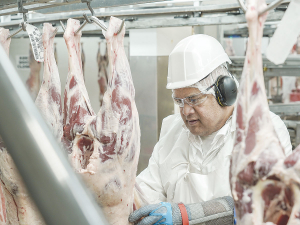Meat Industry Association CEO to Step Down
The Meat Industry Association of New Zealand (MIA) today announced that Chief Executive Officer Sirma Karapeeva has resigned from the role.
 The meat sector has signed a new sector agreement with the Government to bring more migrant meat workers into the country.
The meat sector has signed a new sector agreement with the Government to bring more migrant meat workers into the country.
The Meat Industry Association (MIA) claims a new sector agreement could be vital in addressing the significant labour shortages in New Zealand’s meat processing sector.
The Government’s new sector agreement with the industry includes access to migrant workers for entry-level red meat processing roles at $24 per hour with a cap on the number of visas. This will be replaced with a Pacific programme from 2024.
The Government has also made sector agreements with four other sectors: Aged care, construction and infrastructure, seafood, and seasonal and snow adventure tourism.
Migrants taking up these places will receive a seven-month visas and the wage threshold will be updated each year to reflect changes in the median wage to maintain its relative value.
Sirma Karapeeva, chief executive of the MIA, says labour shortages have been a significant issue for the meat processing sector for some time.
She says the agreement is a welcome boost to the MIA’s domestic recruitment efforts.
“Without sufficient employees, processors cannot run plants to the desired capacity, fully process all products and capture the maximum value,” she says.
One example of this, Karapeeva says, is the shortage of skilled knife people which means that a reduced number of cuts can be prepared for the chilled market meaning the product has to be exported as frozen at a lower value, with by-products sent to rendering instead of further processing.
“This deprives processors and farmers of revenue but also rural communities and the New Zealand economy of income.
“Meat processors are predominantly based in the regions so enabling meat processors to operate at their desired capacity will provide additional money to the communities where they are located.”
Karapeeva says the industry is committed to training and employing New Zealanders first, adding they have been working closely with the Ministry for Social Development and regional agencies to recruit people from local communities to work in plants.
“However, we struggle to fill roles and the meat processing sector is approximately 2,000 employees short at present. That means we must recruit a limited number of people from overseas. Less than five per cent of our workforce is from abroad.
“Ultimately, labour shortages mean fewer shifts and training opportunities for New Zealand workers.”
Karapeeva says the MIA looks forward to working with the Government on Workforce Transition Plans and Industry Transformation Plans.
“The measures announced by the Government will help us unlock further value and deliver even greater benefits to the New Zealand economy.”
However, not all are happy with the announcement. FIRST Union general secretary Dennis Maga claims the agreements could undermine wages and conditions in key sectors.
“We represent workers in three of the five industries for which sector agreements have been announced by Immigration Minister Michael Wood – construction, meat and seafood – but there has been no consultation with us whatsoever,” Maga says.
Maga describes the sector agreements as a “cheap labour stitch-up between the Government and businesses.”
"The immigration rebalance was supposed to push back against this kind of wage repression, but it seems that the Government is conspiring to undercut this approach,” he says.
Maga says immigration reinvestment, including improving pay and conditions for existing migrant workers, must take priority over rebalancing immigration numbers.
"There are people already here who would significantly benefit New Zealand by upskilling or retraining for these key sectors," he says.
Immigration Minister Michael Wood says the “immigration rebalance” was designed during the pandemic and included the flexibility to respond to scenarios like the global labour shortage.
“We have listened to the concerns of these sectors, and worked with them to take practicable steps to unlock additional labour, we know these measures will help fill skill gaps, as businesses work towards more productive and resilient ways of operating,” Wood says.
“Each agreement also includes expectations for improvement, including the implementation of Workforce Transition Plans and Industry Transformation Plans. Performance against these will be monitored and feed into reviews and decisions about future access to migrants below the median wage,” he says.
The 5+ A Day Charitable Trust has launched a collection of affordable recipes designed to turn everyday vegetables into seasonal stars.
Jane Mellsopp has been confirmed as the new Government Appointee to the New Zealand Meat Board (NZMB).
To celebrate the tenth anniversary of its annual Good Deeds competition, Rabobank will give away $100,000 to improve rural community hubs, schools, clubrooms, and marae across New Zealand.
Agricultural and veterinary product supplier Shoof International has appointed Michaela Dumper as its new chief executive.
Federated Farmers is celebrating following the Government's announcement that young farmers will be able to use their KiwiSaver funds to buy their first home or farm.
The Meat Industry Association of New Zealand (MIA) today announced that Chief Executive Officer Sirma Karapeeva has resigned from the role.

OPINION: A mate of yours truly reckons rural Manawatu families are the latest to suffer under what he calls the…
OPINION: If old Winston Peters thinks building trade relations with new nations, such as India, isn't a necessary investment in…